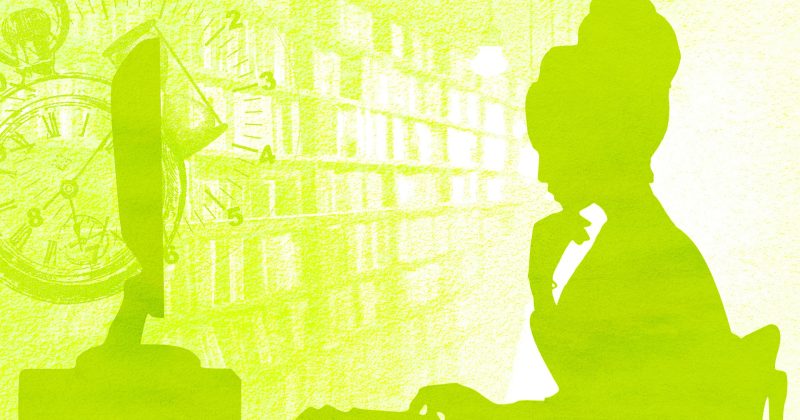Susan O'Rourke | February 17, 2023

This Women’s History Month, educators are called on to teach students about women who not only made it into history but also those who made history, itself —the poets, anthropologists, “authors, songwriters, scholars, playwrights, performers, and grandmothers,” among others, who recorded and interpreted events in their own and others’ lives, communities, and the world. This emphasis on history makers reflects the work educators do every day to bring more diverse perspectives into their lessons, syllabi, media centers, and onto their bookshelves. Educators can continue those efforts by featuring women who “have been active in all forms of media and storytelling including print, radio, TV, stage, screen, blogs, podcasts, and more.” In doing so, the National Women’s History Alliance explains, teachers can “[honor] women in every community who have devoted their lives and talents to producing art, pursuing truth, and reflecting the human condition decade after decade.” These studies can also expand students’ understanding of what it means to “record history” by presenting diverse genres and media that record women’s histories and knowledge, from news articles to cookbooks and beyond.
Learn more about notable women making history below:
Journalists
- Yakeen Bido: Yakeen Bido is a Syrian journalist covering the war in Syria. She is the “first woman to broadcast from the region [and] report on-camera” despite the dangers posed. See also this brief bio from the Syrian Women’s Political Movement website.
- Gulchehra Hoja: Gulchehra Hoja is also a world-renowned Uyghur-American journalist who has reported on the persecution of the Uyghur population by the Chinese government. Along with Bido Hoja was awarded the 2020 International Women’s Media Foundation Courage in Journalism Award. In this interview, Hoja shares that she “sees her ability to understand the language and culture of those affected in China as a benefit, given how difficult it is to get news from the country, where the media is so strictly regulated and tied to the state.”
- Lucy Kassa: Lucy Kassa is an Ethiopian journalist whose reporting has covered human rights violations, including gender-based violence, in Tigray. Kassa has written on identity-based persecution, political and military conflict, and food scarcity in the region. Learn more about the Tigrayan conflict here.
Writers and Poets
- Marisol “Sol” Ceh Moo (pronounced “Kay Mow”): “Ceh Moo is a Yukatek Mayan novelist, poet, short story and essay writer, translator, and interpreter” who writes both in the Mayan language and in Spanish. Ceh Moh has been recognized especially for her character development as she created a “protagonist …. [who] is a woman who breaks the established parameters of conduct for women in contemporary Maya society.”
- Léonora Miano: Miano is a Cameroonian novelist who lived and studied in France. Critics explain that “Miano is one of the most important voices in francophone literature. Novelist, playwright and essayist, she is the author of nearly twenty books in which she explores singular and universal experiences of sub-Saharan or Afro-descendant peoples.” Critics also note that “[her] multi-award-winning first novel, L’intérieur de la nuit (The Interior of the Night), released in 2005, has been part of the Cameroonian high-school curriculum since 2010.”
- Bänoo Zan: Reporters explain that “Zan, a self-exiled Iranian Canadian poet has long made it her concern to report on the injustices Iranians live with daily. She describes her role as a ‘war correspondent in verse.’” Listen to an interview with Zan here.
- Nuala Ní Dhomhnaill (pronounced “Noo-luh Nee Gonnill”): Ní Dhomhnaill is an Irish language writer and activist. Critics note that she “is one of the most prominent poets writing in the Irish language today.” Eammon Wall shared that “Ní Dhomhnaill ‘has renewed interest in poetry written in Irish, has revolutionized how poetry in Irish is written, and has widened the thematic possibilities available to Irish poets, writing in both Irish and English.’ Wall further considered her to be ‘the great love poet of her generation’ and ‘a great poet of place.’”
Food Writers/Historians:
- Rebecca Earle: Earle is a University of Warwick professor and food historian whose research “explore[s] how food, and eating, shaped the experience of colonialism in Spanish America” and delves into “the global history of the potato…. [as] a way of understanding the dramatic changes in ideas about populations, political economy and the state ushered in by the Enlightenment.”
- Jessica B. Harris: Critics at the James Beard Foundation have celebrated how historian, professor emerita, and cookbook author Harris has “[engaged] with the legacies of unsung African Diaspora foodways and cooks” and “[interrogated] a wide-ranging matrix of cuisines, cultures, and ethnicities that chart the migration of people, plants, (diseases), and ideas, previously popularized by Alfred Crosby’s revisionist history, The Columbian Exchange.”
- Michelle King: King is an associate professor at UNC-Chapel Hill where she “specializes in modern Chinese gender history and food history.” King’s research is far-reaching as she “recently edited Culinary Nationalism in Asia…., a collection of comparative studies of culinary nationalism in East, Southeast, and South Asia, and a special issue of Global Food History….on culinary regionalism in China.”
